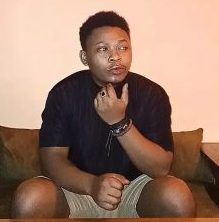Stories to me are full of life just as any one of us is. They’re like a manual, and they guide us through this weird maze we call life.

It’s a little absurd for me, even to this day, that when someone asks me what I do for a living, my answer isn’t that I’m an Economist. It seems like it doesn’t really matter that I spent 5 years drawing graphs and studying why KSh 1000 could pay your rent and dowry 30 years ago but now, it isn’t enough to take your girlfriend out on a coffee date.
And it’s not like I’d have it any other way, far from that actually. It’s just that as much as I enjoyed wording my thoughts on paper, I never really saw myself diving headfirst into writing as a career. Writing to me was the cherry on the cake, not the whole cake. It was one of those things I used to spice up my first dates or talking stages with. How things changed, I don’t know. Well, I technically do know, but I still get hit by a wave of unfamiliarity and mild shock every time I sit in front of my laptop staring at a blank page that’s waiting for me to do with it as I please.
Writing as a profession is nothing like I anticipated. When you’re only used to writing when you feel like it, it’s easy to dupe yourself into believing that Shakespeare could have nothing on you if you two were born in the same era. It’s exhilarating because how else should building alternate worlds and realities in your head feel like? I somehow convinced myself that this is what I wanted to do for the rest of my life, and a silly part of me thought it would still feel as easy and exciting as it did when I only wrote 3-paragraphed poems. Never have I ever been so inaccurate.
It's been slightly over a year since I came out of the closet – the writer's closet to be precise. It’s funny how this analogy best describes the space I was in then because I initially put more effort into forgetting that I loved to write than anything else. Then I had an epiphany smack in the middle of the now-normalised pandemic we had. Being locked down in my small apartment meant I had all the time in the world to think of my life, every little detail of it, and sort of decide what I wanted to do with the rest of it. I know this experience isn’t unique to me as a person, but despite the sorrow and grief the pandemic brought, it did feel like the world had slowed down just to let me figure out the path I wanted to take.
The one mistake I now know better not to make is believing that just because I had committed myself to do ‘what I loved’ meant I’d never have to work a day in my life. God! was I naïve. Personally, being a writer is one of the hardest things I’ve had to be. And it is not because writing is rocket science; it is to some but that’s not the point. Any literate could write if they wanted to. Heck, half of the campus students and fresh graduates in Kenya don’t starve to the bone because they are ‘Academic writers’.
But writing to me had a different connotation to it. Writing meant that I had to have an opinion or something to say, and that didn’t sit well with me considering I’ve always been the ‘ride-along’ guy in almost any setting I found myself in. So, making it my job meant I had to be confident in the things I stood for and believed in. It also was how I unpacked reality in my mind. The prior sentence sounds so vague and silly, don’t worry I cringed when I wrote that part. But I mean it, weirdly enough. Because stories to me aren’t just stories. They carry with them an abstraction of life and reality as we know it.
Years back, like a couple of centuries back, all we had as Africans were our Oral Traditions, among other things of course. We had these people whose sole responsibility was to harbour and tell the communities’ stories for generations to come. In West Africa, these people were known as griots (pronounced gree-ohs). They usually were old men heavy with wisdom and age, and they served (among other duties) as the tribe’s historian and literature repository, giving advice and teaching the ways of the land against the backdrop of the hundreds of stories and narratives they carried with them. I probably would’ve been one of them if I was born before the Bantu migration. Or maybe a weird flu would’ve ended my life before it even began, infant mortality was a menace back then.
My point is, that stories to me are full of life just as any one of us is. They’re like a manual, and they guide us through this weird maze we call life that we found ourselves in. When I sit down and write a story, a part of me feels like I am the story, like I’m all the characters in the story yet none of them at the same time. Most of the time, the stories I write don’t even end the way I thought they would. It’s like they take a life of their own and I just sit there, spewing everything as they command me to.
But it doesn’t always feel like this. Sometimes, I question why I’m doing all that I’m doing. I wonder why I can’t just stick to my day job like every other ‘normal’ person, and forget about writing silly fabricated stories. I sometimes read what I thought to be gold only to delete everything and swear not to write ever again. Writing’s a craft that’s more exhausting than I anticipated, but glorious nonetheless. Glorious because it doesn’t matter how frustrating it usually is, nothing beats the feeling of crafting something out of nothing. Believers call it ex-nihilo; creating out of absolute nothingness. And isn’t that what we humans have always done? It’s probably also one of the few things that make living worthwhile.
Like come to think of it, some of our ancestors lived on trees and ate berries and roots to survive. But somehow over the millennia, we figured out how to cultivate the land and feed our people, how to harness electricity from the elements, how to communicate with someone thousands of miles away from you… all this because someone somewhere made it their life’s mission to actualise whatever was in their head.
Hence, it wouldn’t be far-fetched to say that our minds are the birthplace of our destinations. And it’s merely our task to voluntarily take up whatever is in front of us and mould it into something useful. Well, we can’t all be writers, but somehow, we are all dreamers, chasing that which we hope will give meaning to our feeble existence.





